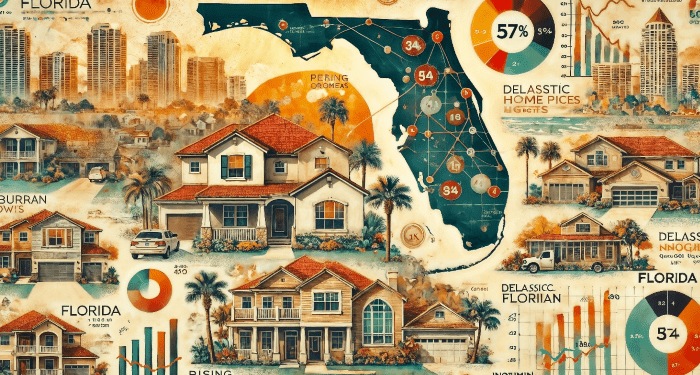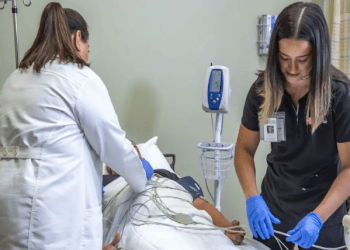Buying a house in Florida can feel overwhelming. The state’s housing market is booming like never before. This article breaks down what first-time buyers need to know, making it easier for you.
Keep reading for essential tips.
Understanding Florida’s Housing Market
Florida’s housing market exhibits diverse trends, with varying regional dynamics and fluctuating prices. Current data shows a mix of affordability challenges and promising opportunities in different cities across the state.
Current Market Trends
The Florida housing market demonstrates a consistent trend of escalating prices and a strong demand. Home costs have increased, making the market challenging for first-time purchasers.
Florida’s interest rates also have a significant impact, affecting potential homeowner’s affordability. The shift to remote work has resulted in more individuals relocating to Florida, looking for houses offering additional space.
Florida’s real estate mirrors its beaches – warm, inviting, and in high demand.
Distinct regional disparities are apparent, as some areas experience greater price increases than others. Locations like Miami and Orlando are especially high-end due to their allure and employment prospects.
This variability emphasizes the importance for buyers to conduct comprehensive local market research before making their purchase decisions. Aware of regional price trends can assist homebuyers in budgeting effectively.
Recognizing these trends encourages us to examine regional differences in housing prices next.
Regional Variations in Housing Prices
Florida’s housing market is unique, with prices varying significantly across different regions. Here’s a breakdown of the regional variations in housing prices:
| Region | Average Home Price |
| Miami | $450,000 |
| Orlando | $320,000 |
| Tampa | $290,000 |
| Jacksonville | $240,000 |
| Tallahassee | $230,000 |
This table shows that Miami has the highest average home price, while Tallahassee offers more affordable options. Prices reflect the demand and living costs in these areas. Next, we’ll discuss the key steps in the home buying process.
Key Steps in the Home Buying Process
Buying a house in Florida is an exciting journey for first-time homebuyers. Knowing the key steps can make the process smoother and more understandable. Here are the essential steps to follow:
- Start by getting your finances in order. Check your credit score, as this will affect your mortgage rates and loan options.
- Determine how much you can afford to spend on a house, including the down payment and monthly mortgage budget.
- Find a real estate agent who knows the Florida housing market well. They can guide you through homes that fit your budget and preferences.
- Get pre-approved for a mortgage to know exactly how much you can borrow before you start looking at houses.
- Search for homes within your budget in desired Florida neighborhoods, considering factors like schools, commute times, and community amenities.
- Make an offer on a house you love. Your agent will help negotiate terms that work for both you and the seller.
- Once your offer is accepted, have the home inspected to check for any issues that might need fixing before closing.
- Apply for a mortgage with a bank or lender by providing all necessary documentation about your finances and employment.
- Go through the appraisal process where an expert assesses the home’s value to ensure it matches the selling price and loan amount.
- Close on your new home by signing all the paperwork, which includes loan documents and transferring property ownership.
Following these steps will help first-time buyers navigate Florida’s housing market with confidence, leading them closer to homeownership in Florida.

Financial Preparation for First-Time Home Buyers
First-time home buyers in Florida should concentrate on saving for a down payment. The traditional rule is to save at least 20% of the home’s purchase price. Nevertheless, there are programs that offer assistance for first-time buyers with lower down payments, sometimes as low as 3%.
It’s crucial to carefully assess your credit score and debt-to-income ratio before seeking a mortgage. In Florida, the average credit score required for a conventional mortgage is around 680, and most lenders prefer a debt-to-income ratio below 43%.
Moreover, considering property taxes and insurance costs when planning your budget is vital because these expenses can significantly impact the monthly mortgage payments. It’s also important to review all aspects of your financial health, including auto insurance, which can be another significant expense for many households. If you’re looking for affordable auto insurance options that fit your budget, compare quotes by using Young America Insurance quote tool.
Additionally, potential homeowners need to allocate funds for closing costs that typically range from 2% to 5% of the home’s purchase price. For instance, in Florida, closing costs could amount to about $4,000 to $6,500 on a $200,000 home.
These initiatives help alleviate some financial strains associated with purchasing a home in the Sunshine State.
Mortgage Options Available in Florida
When considering mortgage options in Florida, first-time home buyers have numerous choices specifically crafted for their financial circumstances. Government-backed loans, like the Federal Housing Administration (FHA) loans and the U.S. Department of Agriculture (USDA) loans, offer low down payment requirements and flexible credit score guidelines.
Furthermore, the Florida Housing Finance Corporation provides down payment assistance and low-interest rate mortgage programs for eligible buyers. In addition, conventional loans are also popular in Florida’s housing market due to competitive interest rates and various term lengths available.
Furthermore, Veterans Affairs (VA) loans are tailored to promote homeownership for military personnel by offering favorable terms with no private mortgage insurance requirement and a zero down payment option.
Prospective homebuyers in Florida should thoroughly research these options before embarking on their homeownership journey to ensure they select a mortgage aligned with their financial goals.
Additional Considerations for Florida Homebuyers
Florida’s unique climate and geographical location make it essential for homebuyers to consider hurricane preparedness. The state’s vulnerability means that property insurance and emergency plans are crucial aspects to factor in when purchasing a home. For comprehensive insights into homeowners insurance options specific to Florida, explore more here. With Florida being one of the states most prone to natural disasters, understanding the potential risks and implementing necessary precautions is crucial in protecting your investment.
Furthermore, due diligence regarding homeowner association regulations is vital since many properties in Florida are part of homeowner associations. Being aware of these guidelines ensures a smooth transition into your new community without any unexpected restrictions or financial obligations.
Conclusion
Florida’s housing market presents numerous opportunities for first-time homebuyers to explore. The current market trends and regional variations in housing prices offer valuable insights into the state’s real estate landscape.
By understanding the key steps in the home buying process and financial preparation, first-time buyers can confidently handle the nuances of homeownership in Florida. Exploring mortgage options and other considerations will further empower them to make informed decisions as they venture into this significant milestone.
In conclusion, becoming a homeowner in Florida is an attainable goal with careful planning and consideration of all available resources and programs tailored to enhance the home buying experience.











